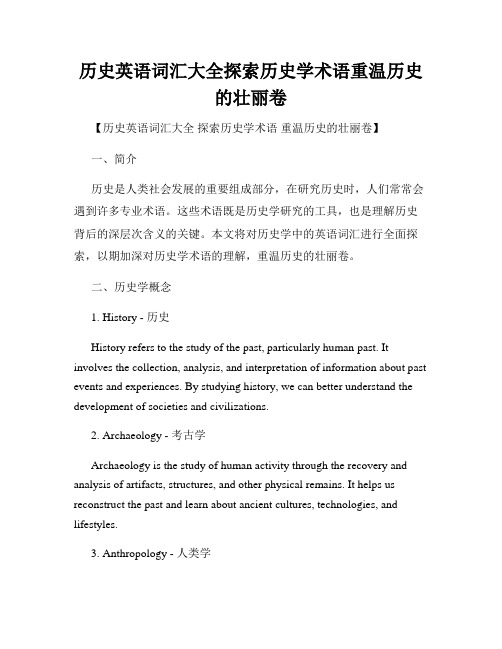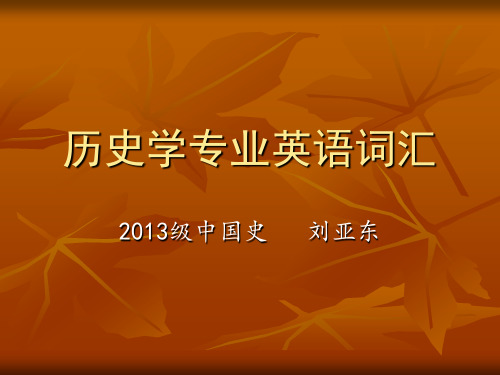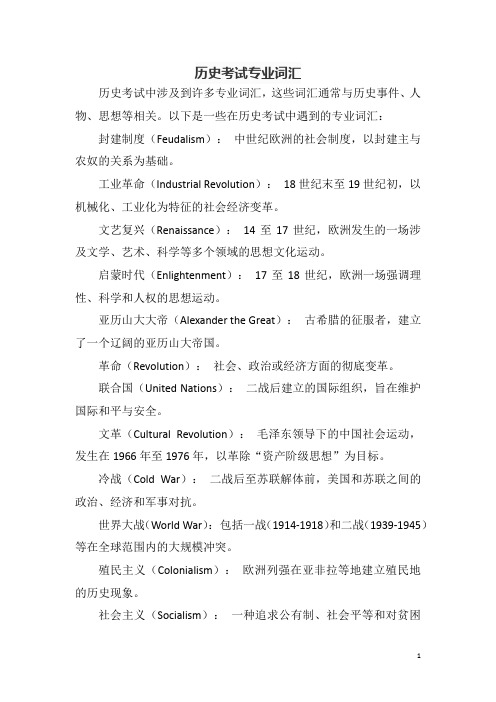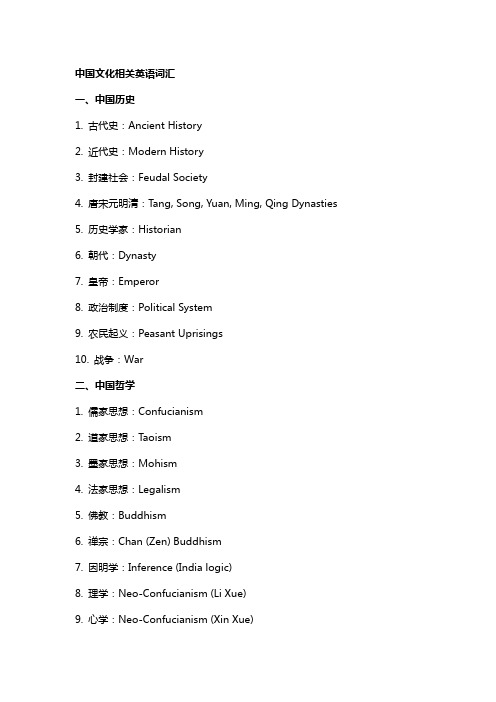历史知识英语单词
托福阅读历史类单词

托福阅读历史类单词1. Civilization 文明,指人类社会在特定地区和特定时期的文化、社会、政治、经济等方面的高度发展和成就。
2. Dynasty 朝代,指一系列统治者在同一家族内继承权力的时期,如中国的汉朝、唐朝等。
3. Empire 帝国,指一个国家或地区通过征服和统一其他地区而扩展的领土和权力。
4. Revolution 革命,指一种突变或变革,通常是指政治、社会或经济体制的彻底改变。
5. Colony 殖民地,指一个国家或地区通过占领和统治其他地区而建立的属地,通常是为了经济或政治目的。
6. Independence 独立,指一个国家或地区摆脱外部控制,获得自主权和自决权。
7. Renaissance 文艺复兴,指15至17世纪欧洲发生的一系列文化和艺术变革,标志着中世纪向现代的转变。
8. Industrialization 工业化,指社会经济结构从农业为主向工业为主转变的过程,通常伴随着技术进步和城市化。
9. Nationalism 民族主义,指对自己民族的独特性和利益的认同和追求,通常伴随着对国家独立和自主性的追求。
10. Revolutionaries 革命家,指参与或领导革命运动的人,通常具有改革社会或政治体制的目标。
11. Dictatorship 独裁政权,指一个国家或地区由一个人或少数人掌握绝对权力的政治体制。
12. Cold War 冷战,指二战后期到1990年代初期,美国和苏联之间的政治、军事和经济对抗。
13. Colonialism 殖民主义,指一个国家或地区通过占领和统治其他地区的政策和实践。
14. Revolutionize 彻底改变,指通过革命性的变革来彻底改变某个领域或行业。
15. Monarchy 君主制,指一个国家或地区由君主(国王或女王)统治的政治体制。
这些单词只是托福阅读历史类单词的一小部分,但它们涵盖了不同历史时期和概念。
在备考托福阅读时,建议多阅读相关历史类文章,提升对这些单词的理解和应用能力。
历史的英文单词

历史的英文单词History is a subject that delves into the past events and experiences of human civilizations. Through the study of history, we can gain insights into the origins of our world and understand how societies have evolved over time. In this article, we will explore some key English words related to history that are essential for any history enthusiast to know.1. AncientThe word "ancient" is used to describe something that belongs to a remote period in history, especially before the Middle Ages. For example, the ancient civilizations of Egypt and Mesopotamia are well-known for their advanced cultures and technologies.2. CivilizationA "civilization" refers to an advanced stage of human social development and organization. It is characterized by the presence of complex institutions, such as governments, economies, and religions. The ancient civilizations of Greece and Rome are often studied for their contributions to modern society.3. EmpireAn "empire" is a vast political entity that rules over multiple territories and peoples. Empires have played a significant role in shaping world history, such as the Roman Empire, which once controlled a large portion of Europe, North Africa, and the Middle East.4. RevolutionA "revolution" is a drastic and fundamental change from the status quo. It can refer to political, social, or technological revolutions that have transformed societies. For example, the Industrial Revolution in the 18th and 19th centuries led to significant advancements in manufacturing and transportation.5. MonarchyA "monarchy" is a form of government in which a single ruler, such as a king or queen, holds supreme authority. Monarchies have existed throughout history, with some famous examples including the British monarchy and the French monarchy before the French Revolution.6. DemocracyA "democracy" is a system of government in which power is vested in the hands of the people, either directly or through elected representatives. Ancient Greece is often credited with the development of democratic principles, which have influenced modern political systems around the world.7. ColonialismColonialism refers to the practice of establishing and maintaining colonies in distant territories. During the Age of Exploration, European powers such as Spain, Portugal, and Britain colonized vast regions of the Americas, Africa, and Asia for economic and strategic purposes.8. RenaissanceThe "Renaissance" was a period of cultural and intellectual rebirth in Europe, spanning from the 14th to the 17th centuries. It marked a revival ofinterest in classical art, literature, and philosophy, leading to significant advancements in science, art, and architecture.9. IndustrializationIndustrialization refers to the process of transitioning from an agrarian and handicraft-based economy to one based on large-scale industry and manufacturing. The Industrial Revolution in the 18th and 19th centuries transformed societies by increasing productivity and urbanization.10. NationalismNationalism is a political ideology that emphasizes the interests and identity of a specific nation or ethnic group. It has played a crucial role in shaping modern history, with the rise of nationalist movements leading to the formation of new states and the dissolution of empires.In conclusion, these English words related to history provide a glimpse into the diverse and complex tapestry of human experiences throughout the ages. By understanding these key terms, we can enrich our knowledge of the past and appreciate the interconnectedness of historical events and developments. History is not merely a collection of dates and facts but a living narrative that continues to shape our present and future.。
历史英语词汇大全探索历史学术语重温历史的壮丽卷

历史英语词汇大全探索历史学术语重温历史的壮丽卷【历史英语词汇大全探索历史学术语重温历史的壮丽卷】一、简介历史是人类社会发展的重要组成部分,在研究历史时,人们常常会遇到许多专业术语。
这些术语既是历史学研究的工具,也是理解历史背后的深层次含义的关键。
本文将对历史学中的英语词汇进行全面探索,以期加深对历史学术语的理解,重温历史的壮丽卷。
二、历史学概念1. History - 历史History refers to the study of the past, particularly human past. It involves the collection, analysis, and interpretation of information about past events and experiences. By studying history, we can better understand the development of societies and civilizations.2. Archaeology - 考古学Archaeology is the study of human activity through the recovery and analysis of artifacts, structures, and other physical remains. It helps us reconstruct the past and learn about ancient cultures, technologies, and lifestyles.3. Anthropology - 人类学Anthropology is the study of humans and human societies, focusing on their culture, biology, language, and social structures. It provides insights into the diversity and evolution of human beings.4. Paleontology - 古生物学Paleontology is the study of prehistoric life through the examination of plant and animal fossils. It helps us understand the history of life on Earth and the evolutionary processes that have shaped different species.5. Historiography - 历史学方法论Historiography refers to the study of historical writing and the methods used by historians to gather and interpret information. It involves analyzing sources, evaluating evidence, and constructing narratives about the past.三、历史时期1. Ancient History - 古代史Ancient history refers to the period of human history before the Middle Ages, typically covering the civilizations of Mesopotamia, Egypt, Greece, Rome, and others. It encompasses a wide range of cultures and developments.2. Medieval History - 中世纪史Medieval history covers the period between the fall of the Western Roman Empire and the beginning of the Renaissance. It includes the rise of feudalism, the spread of Christianity, and the development of chivalry and Gothic art.3. Renaissance - 文艺复兴The Renaissance was a cultural and intellectual movement in Europe that spanned from the 14th to the 17th century. It marked a shift from the medieval to the modern world, with significant advancements in art, science, and philosophy.4. Enlightenment - 启蒙运动The Enlightenment was an intellectual and philosophical movement in Europe during the 18th century. It emphasized reason, rationality, and science, challenging traditional authority and promoting individual freedom and equality.5. Industrial Revolution - 工业革命The Industrial Revolution was a major turning point in human history, characterized by the transition from handmade goods to machine production. It began in the late 18th century in Britain and had far-reaching impacts on society, economy, and technology.四、重要历史事件1. American Revolution - 美国革命The American Revolution was a political and military conflict between Great Britain and thirteen British colonies in North America. It resulted in the formation of the United States of America and inspired revolutionary movements worldwide.2. French Revolution - 法国大革命The French Revolution was a period of radical social and political upheaval in France, resulting in the overthrow of the monarchy and the riseof Napoleon Bonaparte. It had a profound impact on European history andthe spread of democratic ideals.3. World War I - 第一次世界大战World War I was a global conflict that lasted from 1914 to 1918, involving many of the world's major powers. It caused unprecedented destruction and loss of life, leading to significant political and social changes.4. Cold War - 冷战The Cold War was a period of political tension and rivalry between the United States and the Soviet Union after World War II. It was characterized by the arms race, ideological competition, and proxy wars, shaping global politics for several decades.5. Civil Rights Movement - 民权运动The Civil Rights Movement was a social and political struggle for equal rights and racial equality, primarily in the United States. It challenged racial segregation and discrimination, leading to significant legal and social changes.五、结语通过对历史学术语的探索,我们可以更深入地理解过去文明的发展和演变。
历史英语词汇大全掌握历史事件与人物的专业术语

历史英语词汇大全掌握历史事件与人物的专业术语历史英语词汇大全:掌握历史事件与人物的专业术语在学习历史的过程中,了解并掌握相关的专业术语是非常重要的。
不仅可以帮助我们更好地理解历史事件和人物,还可以提升我们的学术素养。
本文将为您提供一个历史英语词汇大全,帮助您掌握历史事件与人物的专业术语。
1. Ancient Civilization (古代文明)- Mesopotamia (美索不达米亚): An ancient civilization located in the Tigris-Euphrates river system, known for its invention of writing, development of urban society, and establishment of the world's earliest known legal code, the Code of Hammurabi.- Ancient Egypt (古埃及): A civilization along the Nile River known for its pyramids, pharaohs, and hieroglyphics. It developed a complex religious and funerary system and made significant contributions to mathematics, architecture, and medicine.2. Classical Antiquity (古典古代)- Ancient Greece (古希腊): The birthplace of democracy, known for its philosophers such as Socrates, Plato, and Aristotle. It made significant contributions to literature, theater, and science. Famous city-states include Athens and Sparta.- Ancient Rome (古罗马): A civilization that expanded from a small village to a vast empire, known for its legal system, engineering marvels like the Colosseum and aqueducts, and influence on European culture.3. Middle Ages (中世纪)- Feudalism (封建制度): A social and economic system based on the exchange of land for military service and loyalty. It characterized much of Europe during the Middle Ages.- Crusades (十字军东征): Series of military expeditions by Christians from Western Europe to reclaim the Holy Land from Muslim control. They lasted from the 11th to the 13th century.4. Renaissance (文艺复兴)- Humanism (人文主义): An intellectual movement that emphasized the study of classical texts, the importance of human potential, and the pursuit of knowledge, art, and science.- Leonardo da Vinci (列奥纳多·达·芬奇): An Italian polymath known for his contributions in the fields of art, science, mathematics, and engineering. Best known for his paintings Mona Lisa and The Last Supper.5. Age of Exploration (探险时代)- Christopher Columbus (克里斯托弗·哥伦布): An Italian explorer who completed four voyages across the Atlantic Ocean, opening the way for widespread European exploration and the eventual colonization of the Americas.- Ferdinand Magellan (费尔南多·麦哲伦): A Portuguese explorer who led the first circumnavigation of the globe. His expedition proved that the Earth was round.6. Industrial Revolution (工业革命)- Steam engine (蒸汽机): Invented by James Watt, the steam engine was a key invention that revolutionized transportation, manufacturing, and agriculture during the Industrial Revolution.- Factory system (工厂体系): A method of manufacturing that brought workers and machinery together in one place, leading to increased efficiency and mass production.7. World Wars (世界大战)- Treaty of Versailles (凡尔赛条约): The peace treaty signed in 1919, officially marking the end of World War I. It placed full blame on Germany and imposed heavy reparations, leading to future political and economic tensions.- D-Day (诺曼底登陆): The Allied invasion of Normandy, France on June 6, 1944, during World War II. It marked a major turning point in the war and led to the eventual defeat of Nazi Germany.通过了解并熟练掌握这些历史英语词汇,我们可以更深入地了解历史的各个时期和相关的事件与人物。
历史知识英语单词

历史知识英语单词对于历史,有人爱之,有人厌之。
但是不管怎样,学习英语的人是要记住它的一些基本词汇的。
下面,我们来看看一些历史知识。
1).historyWhen l was in junior middle school, my favorite subject is history.1).n.历史初中时,我最喜欢的科目就是历史了。
2).chronicleWe can find out almost all the famous battles from the chronicle2).n.编年史从这部编年史中,我们几乎可以找出所有著名的战役。
3).ancientPeople in ancient time used to travel in carriages because there were no cars at that time3).adj.古代的古代的人们出门乘坐马车,因为当时没有汽车可乘的。
4).colonyNo one wants his own country to become the colony Of other countries4).n.殖民地没有人想要自己的国家变成其他国家的殖民地。
5).dynastyErecting a dynasty is not so easy as you imagined before5).n.王朝,朝代建立一个王朝并非你之前想象的那么容易。
6).crownGetting the crown means that seizing the sovereignty of thecountry6).n.王冠,王权,王位获得王冠意味着获取了这个国家的统治权。
7).kingEventually he was elected to be the king of the country for his bravery7). n.君主,国王最终,由于英勇他被推举为这个国家国王。
历史学专业英语词汇

2013级中国史 刘亚东
1.Cathay [kæˈθe ] 华夏 e.g. And Cathay, which was produced under such manipulated factors, has played an important role in American and English literature.基于这些操控因素诞生的《华夏集》 的确对英美文学产生了重要影响。 2.pre-Qin philosophers [fɪ‘lɑsəfər] 先秦诸子 e.g. Chinese culture is one hundred schools of tho-ught in this division and among thepre-Qin philos- ophers constantly develop and enrich the up.中国文化就是在这些先秦诸子 学派的分合之中不断地发展和丰富起来的。
19.enlightment campaign启蒙运动. e.g. Since the Enlightment Campaign ,society and democracy have been linked to the idea of freedom and choice.从启 蒙运动开始,社会、民主就与自由、选择的概念联系 在一起。 20.the Northen Warlords[‘wɔr.lɔrd]北洋军阀. e.g. The ruling period of the Northern Warlords was the full developing stage of bureaucrat capital.北洋军阀统治时 期是官僚资本全面扩展的阶段。
历史考试专业词汇

历史考试专业词汇历史考试中涉及到许多专业词汇,这些词汇通常与历史事件、人物、思想等相关。
以下是一些在历史考试中遇到的专业词汇:封建制度(Feudalism):中世纪欧洲的社会制度,以封建主与农奴的关系为基础。
工业革命(Industrial Revolution):18世纪末至19世纪初,以机械化、工业化为特征的社会经济变革。
文艺复兴(Renaissance):14至17世纪,欧洲发生的一场涉及文学、艺术、科学等多个领域的思想文化运动。
启蒙时代(Enlightenment):17至18世纪,欧洲一场强调理性、科学和人权的思想运动。
亚历山大大帝(Alexander the Great):古希腊的征服者,建立了一个辽阔的亚历山大帝国。
革命(Revolution):社会、政治或经济方面的彻底变革。
联合国(United Nations):二战后建立的国际组织,旨在维护国际和平与安全。
文革(Cultural Revolution):毛泽东领导下的中国社会运动,发生在1966年至1976年,以革除“资产阶级思想”为目标。
冷战(Cold War):二战后至苏联解体前,美国和苏联之间的政治、经济和军事对抗。
世界大战(World War):包括一战(1914-1918)和二战(1939-1945)等在全球范围内的大规模冲突。
殖民主义(Colonialism):欧洲列强在亚非拉等地建立殖民地的历史现象。
社会主义(Socialism):一种追求公有制、社会平等和对贫困的关切的政治经济体制。
这只是一个小小的范例,历史考试中的专业词汇会根据考试范围和内容有所不同。
建议参考具体的历史教材和考试大纲,以了解相关的专业词汇。
中国文化相关英语词汇

中国文化相关英语词汇一、中国历史1. 古代史:Ancient History2. 近代史:Modern History3. 封建社会:Feudal Society4. 唐宋元明清:Tang, Song, Yuan, Ming, Qing Dynasties5. 历史学家:Historian6. 朝代:Dynasty7. 皇帝:Emperor8. 政治制度:Political System9. 农民起义:Peasant Uprisings10. 战争:War二、中国哲学1. 儒家思想:Confucianism2. 道家思想:Taoism3. 墨家思想:Mohism4. 法家思想:Legalism5. 佛教:Buddhism6. 禅宗:Chan (Zen) Buddhism7. 因明学:Inference (India logic)8. 理学:Neo-Confucianism (Li Xue)9. 心学:Neo-Confucianism (Xin Xue)10. 先秦诸子:Pre-Qin thinkers (such as老子Laozi, 孔子Confucius, 孟子Mencius, 等)三、中国艺术1. 绘画:Painting (国画Traditional Chinese painting)2. 书法:Calligraphy (篆刻Seal cutting)3. 陶瓷:Ceramics (瓷器Porcelain)4. 玉器:Jadeware5. 雕刻:Sculpture (木雕Wood carving, 石雕Stone carving)6. 音乐:Music (传统音乐Traditional music)7. 舞蹈:Dance (民族舞Ethnic dance)8. 戏曲:Opera (京剧Peking Opera, 地方戏Local operas)9. 建筑:Architecture (园林Garden, 四合院Siheyuan)10. 中国结:Chinese knot四、中国文学1. 文言文:Classical Chinese (古文Ancient prose)2. 白话文:Colloquial language (白话文Vernacular Chinese)3. 诗歌:Poetry (古诗Ancient poetry, 新诗Modern poetry)4. 小说:Novel (古典小说Classical novels, 现当代小说Modern and contemporary novels)5. 散文:Prose (山水散文Landscape prose, 游记Travelogue)6. 剧本:Drama (戏曲Opera, 话剧Drama)7. 寓言:Fable (故事Story)8. 民间文学:Folk literature (传说Legend, 歌谣Ballad)9. 说唱艺术:Art of storytelling and ballad singing (评书Storytelling, 大鼓Great drum performance)10. 儿童文学:Children's literature (童话Fairy tale)。
- 1、下载文档前请自行甄别文档内容的完整性,平台不提供额外的编辑、内容补充、找答案等附加服务。
- 2、"仅部分预览"的文档,不可在线预览部分如存在完整性等问题,可反馈申请退款(可完整预览的文档不适用该条件!)。
- 3、如文档侵犯您的权益,请联系客服反馈,我们会尽快为您处理(人工客服工作时间:9:00-18:30)。
历史知识英语单词
对于历史,有人爱之,有人厌之。
但是不管怎样,学习英语的人是要记住它的一些基本词汇的。
下面,我们来看看一些历史知识英语单词。
1).history
When l was in junior middle school, my favorite subject is history.
1).n.历史
初中时,我最喜欢的科目就是历史了。
2).chronicle
We can find out almost all the famous battles from the chronicle
2).n.编年史
从这部编年史中,我们几乎可以找出所有著名的战役。
3).ancient
People in ancient time used to travel in carriages because there were no cars at that time
3).adj.古代的
古代的人们出门乘坐马车,因为当时没有汽车可乘的。
4).colony
No one wants his own country to become the colony Of other countries
4).n.殖民地
没有人想要自己的'国家变成其他国家的殖民地。
5).dynasty
Erecting a dynasty is not so easy as you imagined before
5).n.王朝,朝代
建立一个王朝并非你之前想象的那么容易。
6).crown
Getting the crown means that seizing the sovereignty of the country
6).n.王冠,王权,王位
获得王冠意味着获取了这个国家的统治权。
7).king
Eventually he was elected to be the king of the country for his bravery
7). n.君主,国王
最终,由于英勇他被推举为这个国家国王。
8).imperial
The blower said that his great-grandfather once served in the palace as an imperial guard.
8).adj.帝国的,皇帝
吹牛者说他的曾祖父曾经在皇宫里做过的皇家侍卫。
9).royal
Didn't you know that the crown was worn by the king as the sign of royal power?
9).adj.国王的,王室的
你难道不知道国王戴的皇冠是上权的标志吗?
10).prince
A handsome prince fell in love with a poor girl who lived by selling flowers
10).n.王子,亲王
英俊的王子爱上了一个以卖花的为生的穷苦的女孩。
11).enthrone
When this emperor was enthroned, he was only eight years old
11).v.使登基,使即位
当这位皇帝登基时,他只有8岁。
12).palace
We all know that the palace in the old days becomes a sight-seeing resort
12).n.宫殿
我们都知道这个昔日的宫殿变成了一处观光景点。
13).slavery
Lincoln is a good president in American history who tried his best to abolish slavery
13).n.奴隶制,奴役
林肯是美国历史上的一位好总统,他尽自己最大的努力废除奴隶制度。
14).feudalism
Talking of feudalism, the old man seemed to have a lot of miserable stories to tell me
14).n.封建制度,封建社会
提起封建制度,这位老人似乎有很多悲惨的故事要告诉我。
15).exploit
The greedy capitalist was punished eventually because he exploited workers.
15).v.剥削,利用,n.功绩
这个贪婪的资本家因为剥削工人最终受到了惩罚。
16).feudalism
How much do you know about feudalism?
16).n.封建制度
对封建制度了解多少?
17).chronology
l bet you can't recite the chronology at the back of the textbook.
17).n.年表,年代学,按年代顺序记载
我打赌你不能把课本后面的年表背下来。
